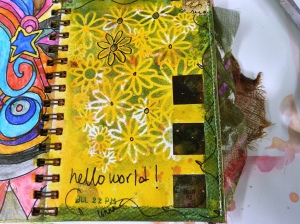This week #ocTEL MOOC takes a look at “Platforms and Technologies“. It’s a topic that I’ve really been looking forward to as I want to gain a better understanding of the pros and cons of hosted and open source options. Why? because like it says in the course notes and commentary, I realise that
ultimately this is about power and control. Within educational technology, power and control basically means the forms of pedagogy that a tool enables or prevents.
However, it looks like such lofty ambitions will have to wait a bit longer because I’m going to be pushed for time this week and have, in the meantime, become interested by something related to the “one thing” activity. Namely, narrative learning and its facilitation through blogging or, if I’m going to tie this in to the theme of the week, blogging platforms. The “one thing” activity asked that we refresh our memory in relation to Kolb’s Experiential Learning Theory and then think about the use of technology in terms of the learning cycle and learning styles that he advocates. Well, I’ve never been sold on the theory of learning styles, but this time I wasn’t inclined to be sold on Kolb’s experiential learning theory as much as I might have been in the past either. This is because I’ve recently been investigating the role that stories play in learning, and it’s led me to think about narrative learning and to consider experiential learning more widely.
In adulthood, learning is integrally related to lived experience, but the relationship between lived experience and learning can be understood in a number of ways. Similarly, conceptualisations of when learning actually occurs can be understood in a number of ways too. According to Kolb, individuals choose a way of “grasping the experience”, and choose a way to “transform the experience” into something meaningful and usable. In constructivist learning theory such as this, the learner connects to the experience by reflecting upon it, thus learning is located in reflection. It might be said that constructivist interpretations see the person and their experiences as existing somewhat separate from one another. However, within situated learning theory the learning is seen as occurring in the interaction between learners and their contexts, and reflection as occurring within this social and highly contextual interaction. Narrative learning theory though, still under the constructivist umbrella, argues that there is a much closer connection between learners and experience. It regards experience as being prelinguistic; that is, experience must afterwards be “languaged”, or storified, and it’s in the process of “languaging”, or narrating, the experience and ascribing meaning to it that learning occurs.
Experience is the basis of meaning making, and it’s in the construction of the narrative, the way in which it’s made accessible to language that determines the meaning individuals ascribe to it. Individuals need to make sense of many many experiences, as Clark and Rossiter point out in the article that I’ve been reading
Everyday we are bombarded by a dizzying variety of experiences and we make sense of those by storying them, by constructing narratives that make things cohere. Coherence creates sense out of chaos by establishing connections between and among these experiences.[...] Narrative is also how we craft our sense of self, our identity.
The quest for sense and coherence through the construction of narrative, or story, is how we demonstrate our growing understanding of a thing and it’s how we make our learning visible, not just to ourselves but to others too.
I find that blogging is not only a way of making learning visible, but it’s a powerful way to achieve learning too, striving to narrate understanding, make sense and achieve coherence.
Thus, informed by experiential learning theory, narrative learning can be seen as not just fostering learning through the telling of stories, but as the learning process itself. What’s absolutely fabulous about this though is the sheer amount of tools available to tell stories and to be a narrative learner today.
I’m glad that as part of this week’s activities, I didn’t reflect on whether or not I accommodate Kolb’s learning styles in my teaching/learning because otherwise I wouldn’t have considered accommodating learning “narrative style”, whereas now I most certainly do. I’m also glad, that on open courses such as this that I’m given license to choose my own learning pathways – previously not sticking to the question would have had me marked out as being awkward, and would have lost me marks. This is way better. Self-determined narrative learning rocks!!
Thanks #ocTEL folks.
Image source: http://www.flickr.com/photos/creativelenna/5972887692/
References: Clark, C. and Rossiter, M. ( 2008) Narrative Learning in Adulthood. New Directions for Adult and Continuing Education, no. 119, Fall.

This work is licensed under a Creative Commons Attribution-NonCommercial-ShareAlike 3.0 Unported License.
